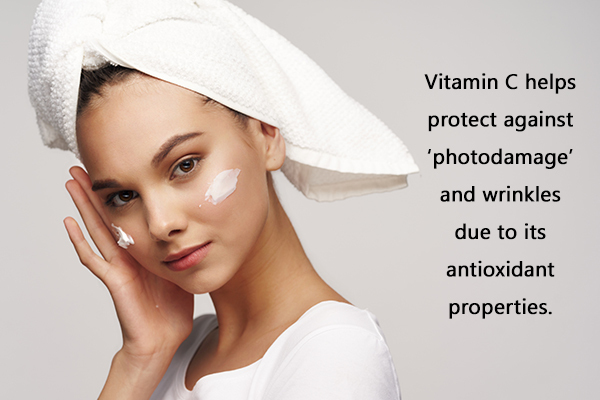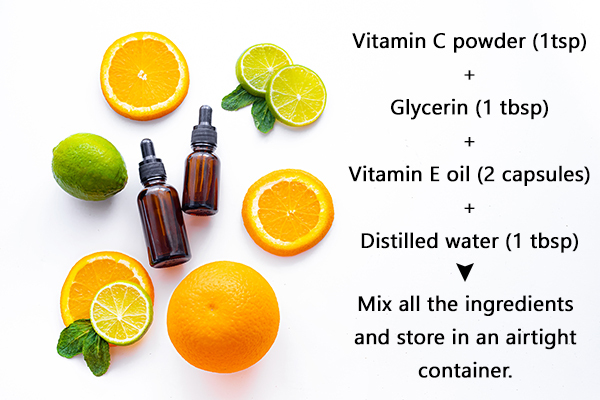In this article:
Vitamin C is the most vital nutrient for your skin. It is a powerful antioxidant that helps fight skin damage and also stimulates the production of collagen in the body.

Collagen is an important building block of skin cells. It helps repair damaged skin cells, prevents aging, (1) and provides structural support to your skin. (2)
What Does Vitamin C Do for the Skin?
Vitamin C helps increase the levels of collagen in your skin. This helps make your skin soft and smooth and protects it from damage. Vitamin C helps prevent wrinkles (3) and also plays a role in regulating cell growth and synthesis to prevent skin diseases. (4)
Benefits of Vitamin C
Vitamin C is important for a number of processes. It helps:
- Decrease wound healing time (5)
- Boost immunity (6)
- Increase absorption of iron from food (7)
- Improve the health of the skin and bones (8)
Benefits of Vitamin C on Skin
Vitamin C supports skin health in the following ways:
1. Offers photoprotection

Vitamin C, also known as ascorbic acid, plays a vital role in boosting the production of collagen in the body.
It contains antioxidant properties that help protect the skin against free radical damage and also protects the skin from UV damage. UV (ultraviolet) rays in sunlight can be harmful to the skin.
The antioxidants in vitamin C help fight free radical damage caused by UV exposure. (9)
2. Prevents hyperpigmentation
Hyperpigmentation refers to the uneven darkening of the skin caused by an increase in melanin production. Melanin is the pigment that adds color to your skin and hair.
Melanin production can be influenced by sun exposure, hormonal fluctuations, and age. Vitamin C helps regulate melanin synthesis and thus prevents hyperpigmentation. (10)
3. Averts photodamage/wrinkling

Excessive exposure to sunlight can result in skin damage caused by UV rays. Vitamin C helps protect against photodamage and wrinkles through its antioxidant properties.
Topical vitamin C application for at least 12 weeks helps clear up your skin, slows down aging, and gives you a brighter complexion. It also promotes collagen production and skin healing. (11)
4. May resolve dry skin
Ascorbic acid helps prevent water loss from the skin and thereby prevents wrinkles and dryness. Vitamin C consumption helps in the reduction of transepidermal water loss (TEWL). (3)
However, recent studies show that topical application of vitamin C may inadvertently increase skin dryness, so it is unclear whether vitamin C can be safely used topically on dry skin.
5. Evens out skin tone
Vitamin C is widely used to treat redness and blotchy skin as it promotes blood flow to the area and evens out the skin tone. Vitamin C helps mend tiny, broken capillaries that may be causing red patches on your skin. (12)
6. Improves elasticity
Consuming the required amount of vitamin C and applying it topically can lead to increased collagen production. Collagen gives structural support to the skin and prevents sagging. (2)
7. Helps reduce inflammation

Vitamin C contains anti-inflammatory properties that can soothe irritated skin. It is used to treat flare-ups of acne, dermatitis, rashes, etc. (2)
8. Promotes wound healing
Vitamin C helps decrease wound healing time. (5) It contains anti-inflammatory properties, increases collagen production, and promotes skin repair. (2)
9. Provides antioxidant effects
The UV rays in sunlight can harm your cells (13) and accelerate the skin aging process by triggering the production of free radicals.
Vitamin C contains several antioxidant properties that help fight free radical damage in your skin. Antioxidants also boost your immunity and fight infections.
Recommended Intakes

These are the recommended intake values for vitamin C, according to the Dietary Reference Intakes (DRIs): (14)
- The recommended dietary intake (RDA) of vitamin C per day for healthy adults is 90 mg for men and 75 mg for women.
- Pregnant or breastfeeding women should get at least 85–120 mg of vitamin C per day.
- Smokers should get at least 30 mg more of vitamin C from the recommended daily intake as smoking decreases vitamin C levels in the body. (15)(16)
The average vitamin C intake of a healthy individual per day is known as adequate intake. (AI) (17) The estimated average requirement (EAR) is the nutrient intake required for half of the healthy population. (18)
Tolerable upper intake levels (UL) are the maximum amount of vitamin C a healthy individual can consume in a single day without any side effects. (19) The tolerable upper limit for vitamin C is 2,000 mg. Exceeding this amount may lead to stomach issues such as acidity or diarrhea.
How to Incorporate Vitamin C Into Your Routine

There are different forms of vitamin C in skin care products. It is important to choose pure vitamin C (L-ascorbic acid) rather than other vitamin C derivatives.
Follow these steps to incorporate vitamin C into your skin care routine effectively:
- Cleanse your face with a mild cleanser.
- Massage a few drops of vitamin C serum onto your face and neck.
- Moisturize your skin and apply sunscreen.
Vitamin C should be used regularly for at least 2–3 months for it to make significant changes in your skin.
While it is common to have some minor prickling or tingling when you start using vitamin C, discontinue use if you experience extreme itching, rashes, or irritation. These could be symptoms of an allergic reaction. Apply the serum in the morning or right before bedtime for best results.
DIY Vitamin C Serums for Healthy Skin
Disclaimer: It is advisable to perform a simple patch test before applying vitamin C to a larger area. The acidic nature of vitamin C may not react well with sensitive skin. Always make sure to use a vitamin C product with a pH range of 3.0–3.5.
Here’s how to make homemade vitamin C serum for reaping its skin care benefits.

Recipe 1
This simple homemade vitamin C serum can help treat hyperpigmentation, prevent wrinkles, and smoothen and brighten your skin.
Ingredients:
- Vitamin C powder (store bought) – 1 tsp
- Vitamin E oil – 2 capsules
- Glycerin – 1 tbsp
- Distilled water – 1 tbsp
How to use:
- Add all the ingredients to a bowl. Cut the vitamin E capsules and drain the oil from them into the bowl.
- Mix all the ingredients thoroughly until it forms a paste.
- Apply 2–4 drops of the paste to your face, preferably at bedtime.
- Massage the paste on your face and neck for a few minutes.
- Wash it off the next morning.
Recipe 2
This vitamin C serum can be used as a potent bleaching agent to treat redness and hyperpigmentation.
Ingredients:
- Vitamin C powder – 1 tsp
- Clean water – 1 tsp
- Aloe vera gel – 2 tbsp
- HA gel or glycerin – 1 tsp
How to use:
- Add all the ingredients to a bowl.
- Mix all the ingredients thoroughly to form a paste.
- Apply the serum to your face and neck and massage before bedtime.
- Wash it off the next morning.
Food Sources of Vitamin C

It is well known that citrus fruits are rich in vitamin C. However, many different fruits and vegetables have a higher content of this essential vitamin.
Guavas, pineapples, kiwis, and broccoli contain as much vitamin C as oranges – oftentimes higher. Red peppers, green peppers, broccoli, papaya, etc., are also major sources of it. (20)
Here is a brief list of vitamin C-rich foods:
- Citrus fruits such as oranges and lemons
- Guavas
- Berries (strawberries, blueberries, etc.)
- Kiwi
- Tomatoes
- Brussels sprouts
- Broccoli
- Red, yellow, and green peppers
- Papaya
- Kale
- Grapefruit
- Amla (Indian gooseberry)
Roles of Vitamin C in the Body
Vitamin C is needed for the growth and repair of tissues in all parts of your body. It is used to:
- Aid in the production of certain hormones and neurotransmitters that have major roles in the nervous system.
- Increase energy production in the cells.
- Boost immunity to prevent infections. (21)
- Protect cells against free radical damage due to its antioxidant properties.
- Aid in collagen synthesis. Collagen gives structural support to the skin, hair, bones, and connective tissue.
The human body cannot synthesize vitamin C. Moreover, several factors, such as smoking and inhaling environmental pollutants, can decrease vitamin C levels in your body. (22) Hence, it is important to make sure you get the required amount of vitamin C via your diet.
Did You Know?
Vitamin C helps increase iron absorption in the body, especially plant-based iron forms. However, most of this vitamin is lost while cooking.
Thus, it is best to eat vitamin C-rich foods raw or in the form of juices. If you need to cook, heat them as lightly as possible to protect their nutrient content.
Side Effects of Vitamin C
The maximum amount of vitamin C one can consume safely in a day is 2,000 mg. Any more than that can lead to stomach issues such as acidity, diarrhea, and pain.
It is not recommended to consume a lot of vitamin C during pregnancy as this may counterproductively lead to vitamin C deficiencies in the newborn.
Precautions to Consider
Here are some precautions you should follow before consuming vitamin C supplements:
- Vitamin C supplements can make you sweat and urinate more often, leading to potential water loss. Make sure to remain well hydrated while taking them.
- Vitamin C supplements are usually derived from corn. Avoid supplements sourced from corn if you are allergic to it (try vitamin C from sago palm).
- Vitamin C boosts iron absorption in the body. Do not take them if you have excessive amounts of iron in the body.
- Always consult your doctor before consuming any supplements.
General Queries

Who is at risk of vitamin C deficiency?
Pregnant women, children, patients with kidney disease, critically ill patients, overweight individuals, and aged people are at the highest risk of vitamin C deficiency.
Do I need vitamin C supplements?
Vitamin C is usually safe for consumption by most people. However, very high doses (higher than 2,000 mg per day) can cause an upset stomach.
Final Word
Vitamin C is an essential nutrient required for several body functions. It protects your skin from sun damage, prevents skin aging, promotes wound healing, boosts collagen synthesis to tighten your skin, brightens your complexion, boosts immunity, and provides several antioxidant and anti-inflammatory effects.
Dietary vitamin C is mostly safe for consumption and can help improve your general health. However, topical use of vitamin C may have some minor side effects (such as skin dryness) and is currently under research.
- Was this article helpful?
- YES, THANKS!NOT REALLY


